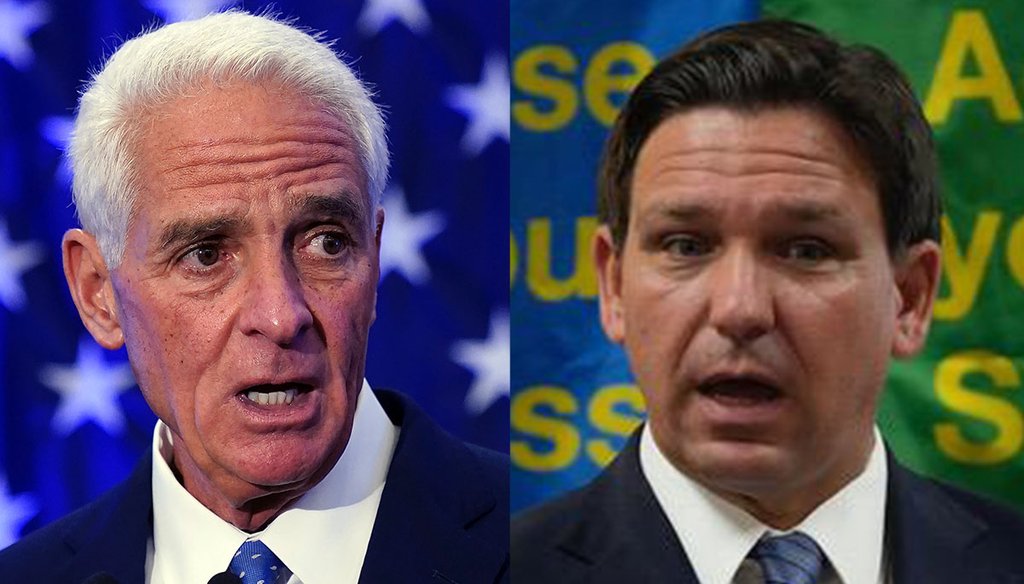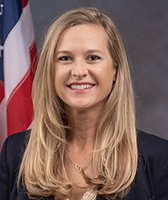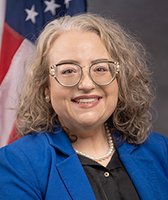Stand up for the facts!
Our only agenda is to publish the truth so you can be an informed participant in democracy.
We need your help.
I would like to contribute

Democrat Charlie Crist and Republican Ron DeSantis debated Oct. 24, 2022, before the midterm elections. (AP)
In Florida's only gubernatorial debate, Republican incumbent Gov. Ron DeSantis dodged questions on whether he's pining for the White House and vowed to put his Democratic rival Charlie Crist "out to pasture."
Crist, who served as governor of Florida from 2007 to 2011, tried repeatedly to get DeSantis to answer whether he'd run for president in 2024. Moderator Liz Quirantes said candidates had agreed not to ask each other questions during the debate, hosted by WPEC-TV, Channel 12 in Fort Pierce, Florida.
DeSantis, who has spent most of his re-election campaign ignoring his opponent, attacked "Biden-Crist" policies for hikes in inflation and gasoline prices. Crist emphasized his support for abortion rights — a position he has not always held — in contrast with the 15-week abortion ban, without exceptions for rape or incest, that DeSantis signed this year.
Some of the candidates' attacks on taxes, education, abortion and pandemic management needed a fact-check.
Crist: DeSantis raised taxes by "$1 billion on every consumer in our state."
PolitiFact rated a similar claim Mostly False. DeSantis signed a 2021 bill to revise Florida's online sales tax, which the state estimated would generate around $1 billion annually. But the law did not establish a new tax; it shifted the responsibility to remit sales tax from consumers to the remote seller. The law, SB 50, required sellers with no physical presence in Florida to collect and remit taxes on items delivered to customers in the state. Before the revision, people were required to remit such taxes to the state — though few did.
DeSantis: Crist as governor, "signed off on the largest increase in taxes and fees in the history of the state of Florida."
Crist, who was a Republican at the time, signed a budget from the Republican-led Legislature that raised taxes and fees by $2.2 billion to offset losses caused by the economic recession and housing crisis. About half of the amount came from auto tag fees, which Crist's successor, Republican Gov. Rick Scott, later rolled back. The 2009 budget increased the cigarette tax as well as fees for fishing licenses and state park admissions, among other charges.
Crist: "You are the only governor in the state of Florida who shut down our schools, businesses. I never did that as governor. You are the shut down guy."
Crist's attack on DeSantis' COVID restrictions seemed odd considering other points of the debate when he said DeSantis did not go far enough. DeSantis is the only governor in modern history who led the state during a major deadly pandemic, which prompted closures of schools and nonessential businesses nationwide. (Crist was governor during the swine flu pandemic, but that was far less deadly or widespread.)
DeSantis closed down schools in mid-March 2020, and they ended up closed for the rest of that school year. Also in the spring of 2020, DeSantis ordered that people in Florida should limit movements outside of their home to only those necessary for essential services. He lifted the last of the business restrictions in September 2020.
At the time, Crist indicated he would have been more aggressive in trying to reduce transmission. As DeSantis referenced in the debate, Crist co-signed a letter with other Florida Democratic representatives in July 2020 urging DeSantis to "immediately impose a statewide mask order and stay-at-home orders recommended by public health officials in parts of the state where the outbreak is raging."
DeSantis: Crist "supports taxpayer funding of abortion all the way up until the moment of birth."
This is misleading and needs context. In an interview with CBS Miami, Crist said he supported the standard set by Roe v. Wade — which allowed abortion until "viability," or when a fetus can survive outside the womb. Fetal viability is generally around 24 weeks into pregnancy, according to the National Library of Medicine. Crist said he supported abortion past fetal viability "in cases where the life or the health of the mother" is threatened. Cases "up until the moment of birth" are rare and involve medical emergencies.
Crist also voted to repeal the Hyde Amendment, which prohibits using federal dollars for abortion. The provision did not address at what stage of pregnancy a person can obtain an abortion.
Crist: DeSantis "made it harder to mail in ballots."
Crist was referring to a 2021 law that included some new rules for voting by mail. It limits the use of ballot drop boxes to early voting hours and requires voters to request mail ballots more frequently than they did in the past. Voters must provide identifying information when requesting mail ballots.
The law aims to crack down on the practice critics call "ballot harvesting," which involves political operatives collecting voters' completed mail-in ballots and turning them in. That practice has already been illegal in Miami-Dade County for many years. The law limits a person to possessing two ballots other than their own, except for immediate family members.
The law left some voting rights unchanged, including that any registered voter can request a mail ballot without an excuse. More than 1 million Floridians have already cast a ballot by mail for the November election.
DeSantis: Crist "has endorsed the idea of … 'reallocating funding away from the police.'"
DeSantis appears to be referring to a plan Crist supported to create a unit of social and mental health workers to respond to nonviolent calls made to the St. Petersburg police department. However, the plan did not redirect funding outside of the department. The program is managed, dispatched and funded by the department. St. Petersburg Police Chief Anthony Holloway told PolitiFact that the department's budget increased because of the program.
Crist told reporters in June 2021: "We have to have proper funding. And we have to do what's right to make sure law enforcement exists and it's healthy and it's safe and it's smarter."
Crist: "According to Forbes magazine, Florida is the number one most expensive state in the country to live in, more than California, more than New York."
Crist's campaign said he intended to cite a CBS article referencing a Realtor.com report.
Realtor.com designated Miami the least affordable U.S. rental market in February and noted other Florida fast-growing rental markets. It's worth noting that rent is not the sole indicator of affordability — real estate taxes, cost of living, transportation, utilities and groceries are also factored in.
The most expensive states to live in are Hawaii, California, Massachusetts, New York and Alaska, according to a recent study by Credit Karma. Florida didn't rank among the 10 least affordable states.
DeSantis: Results show that Florida is "number three in fourth grade reading and number four in the country in fourth grade math."
DeSantis correctly cited Florida's 2022 ranking on the National Assessment of Education Progress, the largest continuing and nationally representative assessment of students' knowledge in core subject areas.
In fourth grade reading, Florida tied Wyoming and trailed Massachusetts. In fourth grade math, Florida's score trailed only Massachusetts, Nebraska and Wyoming.
For the eighth grade metrics, the state was more in the middle of the pack. And DeSantis omitted that Florida, like the rest of the nation, saw declines in scores between 2019 and 2022.
Crist: "Property insurance under you has doubled in the state of Florida. Doubled, Ron."
When DeSantis entered the governor's office in 2019, Florida homeowners paid an average insurance premium of $1,988, according to the Insurance Information Institute. As of August, the state's average homeowners' insurance rate is $4,231, three times the national average. Overall, insurance premiums have more than doubled.
The Legislature passed new property insurance laws in April during a three-day special session prompted by DeSantis, though it did not guarantee property insurance relief for consumers. DeSantis last week called for another special session to stabilize the market.
DeSantis: "Why are fuel and natural gas prices up? The Biden-Crist energy policies."
DeSantis' swipe ignores that global forces play a bigger role in fuel costs than presidential policies. At the start of the coronavirus pandemic in early 2020, gasoline prices fell as demand plummeted. Prices climbed during the subsequent recovery, and they kept climbing around Russia's invasion of Ukraine. The war pressured Western countries to seek oil elsewhere, which sent prices higher and crimped global oil supplies. Together, Russia and OPEC, the group of petroleum-exporting countries, account for a bit over half of global production. OPEC has declined to produce more oil, counter to President Joe Biden's request.
Domestic oil production has been rising, but not fast enough to keep up with demand. Oil companies have been reluctant to invest up front in the additional facilities and supplies that could produce more oil, because doing so would be less profitable and more risky.
RELATED: Charlie Crist on the Truth-O-Meter
RELATED: Ron DeSantis on the Truth-O-Meter
Our Sources
See links in story.



















































